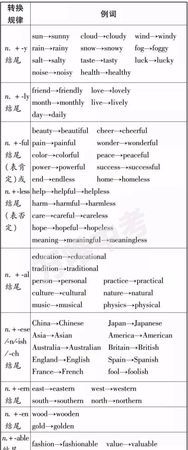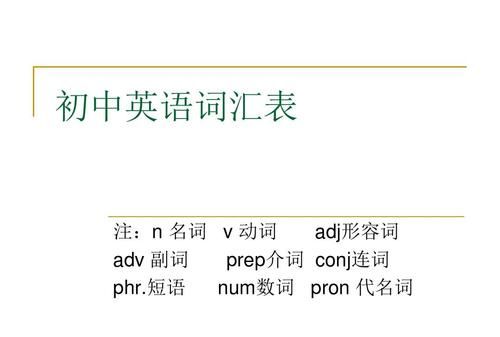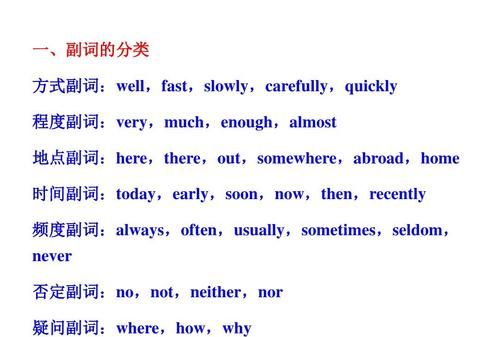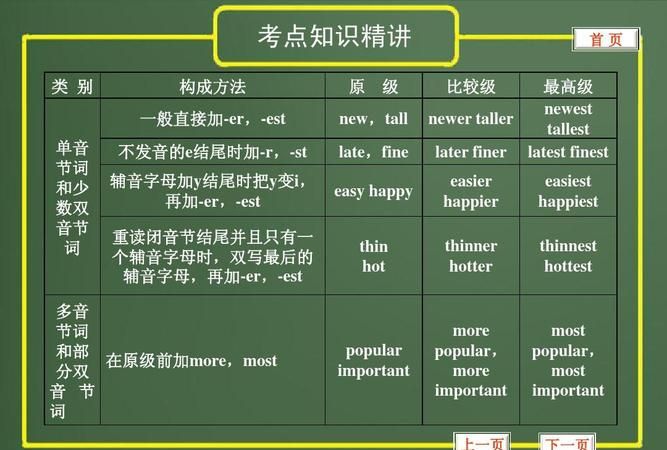本文目录
初中英语副词的用法总结
副词(adverb)是一类用以修饰动词(相当于英语的verb)或加强描绘词组或整个 句子 的词,修饰名词的词一般为形容词,又称限制词。那么接下来给大家分享一些关于初中英语副词的用法技巧,希望对大家有所帮助。
初中英语副词的用法技巧
1.Adverbs of Manner
方式副词
方式副词能够表达出某人完成某事的方式,它最常与行为动词搭配使用。方式副词包括:slowly(慢慢地)、fast(迅速地)、carefully(小心地)、carelessly(粗心地)、effortlessly(不费力地)、urgently(急切地)。
方式副词可以放在句末,或者直接放在动词后。
2.Adverbs of Time and Frequency
时间与频率副词
时间副词能够表达出某事发生的时间。它可以表达出一个具体的时间,例如两天、昨天、三个星期前等。虽然时间副词有时引导一个句子,但它常常放在句末。
3.Adverbs of Degree
程度副词
程度副词通常表示某事完成的程度。它们通常位于句末。
4.Adverbs of Place
地点副词
地点副词告诉我们某事发生的地点。它们包括nowhere(任何地方都不) 、anywhere(任何地方)、outside(外面)、everywhere(到处)。
Tom will go anywhere with his dog.
汤姆去哪都带着他的狗。
初中英语中副词的使用攻略
一、副词的位置:
1) 在动词之前。
2) 在be动词、助动词之后。
3) 多个助动词时,副词一般放在第一个助动词后。
注意:
a. 大多数方式副词位于句尾,但宾语过长,副词可以提前,以使句子平衡。
We could see very clearly a strange light ahead of us.
b. 方式副词well,badly糟、坏,hard等只放在句尾。
He speaks English well.
二、副词的排列顺序:
1) 时间,地点副词,小单位的在前,大单位在后。
2) 方式副词,短的在前,长的在后,并用and或but等连词连接。
Please write slowly and carefully.
3) 多个不同副词排列:程度+地点+方式+时间副词。
注意:副词very 可以修饰形容词,但不能修饰动词。
初中英语副词的分类
副词按词汇意义可分为:
方式副词:well、fast、slowly、carefully、quickly
程度副词:very、much、enough、almost、rather、quite
地点副词:here、there、out、somewhere、abroad、home
时间副词:today、early、soon、now、then、recently
频度副词:always,often,usually,sometimes,seldom,never
否定副词:no,not,neither,nor
疑问副词:where,how,why
其他:also,too,only
副词的基本用法: 副词是用来修饰动词、形容词、其他副词以及全句话,表示时间、地点、程度、方式等概念。
如:We should listen to our teachers carefully. (修饰动词)
He is very happy today. (表时间)
I asked, rather angrily. (修饰adv)
In spring,I can see flowers everywhere. (表地点)
初中英语副词在句子中的位置
1. 方式副词、地点副词、时间副词
(1)通常用于主要动词之后。如果动词有宾语,则用在宾语之后,如:
She sang beautifully.
(2)如果在句子中这几种副词同时出现,通常的次序为方式副词、地点副词、时间副词,如:
She spoke very well at the city hall last night.
方式副词可以用于主要动词前面。但是,如果动词是句子的最后一个词则很少用于动词前面,如:
She silently counted five, then put the receiver down.
She listened silently.
2. 观点副词
常用于句首,然后稍微停顿一下,书面上则用逗号隔开, 这样就起到了修饰后面句子的作用,如:
Surprisingly, most of my help came from the technicians.
3. 频率副词和可能性副词
(1)常用于第一个助动词后或主要动词之前
(2)也可以用于句首
初中英语副词的用法技巧相关 文章 :
★ 关于英语副词的用法
★ 英语副词语法知识点总结讲解练习
★ 英语的副词语法基础
★ 英语学习:副词ago, before
★ 英语中副词及其种类知识讲解
★ 英语副词的用法:副词修饰形容词、数词、名词等
★ 英语语法形容词副词比较级的讲解
★ 英语语法讲解:副词的句法作用
★ 形容词和副词的英语语法讲解

初中英语副词知识点汇总
副词(Adverb 简称adv.)是指在 句子 中表示行为或状态特征的词,用以修饰动词、形容词、其他副词或全句,表示时间、地点、程度、方式等概念。下面我给大家分享一些初中英语副词知识,希望能够帮助大家,欢迎阅读!
初中英语副词知识1
副词的比较级
副词和形容词一样,也有它的比较级和最高级形式. 可以参考形容词的变换形式。但以词尾 -ly 结尾的副词(除 early )须用 more 和 most 。
单音节副词的比较级是在副词后面加上 -er 构成的,最高级是在副词后面加上 -est 构成的。
near nearer nearest
hard harder hardest
多音节副词的比较级是在副词的前面加上 -more 构成的。 最高级是在副词前面加上 -most 构成的。
有些副词的比较级和最高级形式是不规则的。
well-better - best little - less - least
Much- more - most badly - worse - worst
far-farther(further)-farthest(furthest)
副词的比较级和最高级用法同形容词的比较级用法基本一样。 最高级形式句中 the 可以省略。
He works harder than I.
他比我工作努力。
Lucy gets up earlier than Lili.
露西比丽丽起床早。
He runs fastest in our class.
他在我们班跑地最快。
He dives deeper than his teammates.
他比他的队员 潜水 深。
It's true that he speak English more fluently than any of us.
他英语讲的确实比我们任何人都好。
Our school team play football best in our region.
我们校队在我们地区 足球 踢得最好的。
初中英语副词知识2
形容词变副词
①.在形容词词尾直接加-ly。如:real-really; helpful-helpfully; careful-carefully; slow-slowly; quick-quickly; quiet-quietly
②.以辅音字母加y结尾的形容词要变y为i,然后再加-ly。如:busy-busily; angry-angrily; easy-easily
③.某些以辅音字母加不发音的字母e结尾和以-ue结尾的形容词要先去掉e,然后再加-y或-ly。如:terrible-terribly; true-truly; gentle-gently
注意: friendly; motherly; lovely,weekly,lively等词是形容词而非副词。
④.英语中还有少数与形容词同形的副词,例如:daily, early, fast, hard, high, long, near, straight, well等。请比较它们的词义和用法:
the high jump 跳高 项目(形容词) to jump high 跳得高(副词)
a fast car 行得快的汽车(形容词)to drive fast 开快车(副词)
an early riser 早起的人(形容词)to get up early 起得早(副词)
a straight line直线(形容词)Go straight ahead. 一直朝前走。(副词)
注意:兼有两种形式的副词
①.late 与lately:
late意思是"晚"; lately 意思是"最近"。例如:You have come too late. What have you been doing lately?
②.deep与deeply:
deep意思是"深",表示空间深度;deeply时常表示感情上的深度,"深深地"。例如:He pushed the stick deep into the mud. Even father was deeply moved by the film.
③.high与highly:
high表示空间高度;highly表示程度,相当于much 。例如:The plane was flying high. I think highly of your opinion.
④.wide与widely:
wide表示空间宽度;widely意思是"广泛地","在许多地方" 。例如:He opened the door wide. English is widely used in the world.
高中英语副词的用法
1.moreover adv.而且,再者,此外,加之
The firm did the work very well.Moreover,the cost was not too high.
这家公司做得十分出色,而且费用也不太高。
The price is too high,and moreover it isn’t in a suitable position.
价钱太高,而且位置也不合适。
2.therefore adv.因此,所以
He was busy;therefore he could not come.
他很忙,所以不能来。
The new trains have more powerful engines and are therefore faster.
新火车安装了更强的发动机,因此车速更快。
3.otherwise adv.否则,不然
You must pay your taxes on time;otherwise,you will be punished.
你必须及时交税,否则你就会受罚。
You must work hard;otherwise you will not learn English well.
你必须用功,否则就学不好英语。
4.meanwhile adv.与此同时,在此期间
They’ll be here in ten minutes.Meanwhile,we’ll have some coffee.
他们10分钟后到这儿,现在我们先喝点咖啡。
Jane was painting the wall and meanwhile Pat was watching TV.
简在刷墙漆,与此同时帕特在看电视。
5.practically adv.几乎,简直,差不多;实际上,事实上
The holidays are practically over;there is only one day left.
假期差不多完了,只剩下一天了。
Practically,we have solved all these problems.
事实上,我们解决了全部的问题。
6.gradually adv.逐渐地
Things gradually improved.
情况在逐渐改善。
And gradually their talk ceased;long silence followed.
他们的谈话慢慢停了下来,接着便是长时间的沉默。
7.actually adv.实际上,事实上,说实在的
Actually that’s not quite right.
实际上,那不完全正确。
He talks big but doesn’t actually do anything.
他光吹牛,什么实际的事都不干。
8.approximately adv.大约,大概
The accident happened at approximately 5:30.
事故大约发生在五点半。
These visits had continued regularly,approximately every third week.
这些参观定期进行,大约每三周一次。
9.generally adv.通常,一般,广泛地,普遍地
Doctors generally work long hours.
医生通常工作时间都很长。
Generally he watches TV for two hours in the evening.
一般他晚上看两小时的电视。
10.obviously adv.明显地,显然
He was obviously drunk.
他显然喝醉了。
He found a young and beautiful girl,who kept shouting and crying,obviously mad.
他发现了一个年轻漂亮的姑娘,这个姑娘又喊又哭,分明是疯了。
11.however adv.表示转折可是,然而
My room is small;however,it’s comfortable .
我的房间很小,但很舒服。
He said that it was so;he was mistaken,however.
他说情况如此,可是他错了。
12.extremely adv.极其,非常
I admire his courage extremely.
我非常钦佩他的勇气。
I can’t work because your radio is extremely loud.
你的收音机太响,我都不能工作了。
13.narrowly adv.勉强地,差点没
He narrowly escaped being run over.
他差一点被车撞倒。
He narrowly missed being seriously injured.
他差点受了重伤。
14.occasionally adv.偶尔,间或
We only have dinner parties very occasionally these days.
这些日子我们不经常有宴会。
It’s all right to borrow money occasionally,but don’t let it become a habit.
偶尔借点钱倒没什么,只是不要成为一种习惯。
15.eventually adv.最后,终于
He worked so hard that eventually he made himself ill.
他工作如此努力,以至于最后病倒了。
We waited three days for the letter and eventually it came.我们等了三天,信终于来了。
初中英语副词知识点相关 文章 :
★ 初中英语副词的用法技巧
★ 初中英语知识点总结归纳3篇
★ 初中英语必须掌握的19个重点语法知识点
★ 初中英语五种语法知识点总结
★ 初中英语语法知识点总结
★ 10个初二英语重点知识点
★ 高效学习初中英语---初中英语知识点总结
★ 初三英语知识点大总结
★ 初中英语常用知识点总结
★ 初二英语语法知识点汇总

汉语副词修饰什么词
副词可以修饰动词、形容词、其他副词、介词短语及名词或代词。副词是指在句子中表示行为或状态特征的词,表示时间、地点、程度、方式等概念。具体信息大家一起来看看吧。
英语副词用法
1、副词修饰动词:You must do it now. 你必须现在做。
2、副词修饰形容词:This is a very good book. 这是本很好的书。
3、副词修饰其他副词:He was back quite quickly. 他很快就回来了。
4、副词修饰介词短语:I’m all for your plan. 我完全支持你的计划。
5、副词修饰名词或代词:Hardly anyone likes him. 几乎没有什么人喜欢他。
6、方式副词well,badly糟、坏,hard等只放在句尾。例如:He speaks English well.他英语说的很好。
7、频度副词可放在实义动词的前面,情态动词和助动词的后面。例如:I often help him these days.这些天我经常帮助他。
副词用法例句
You must do it now.你必须现在做它。
Put you things over there.把你的东西放在那儿。
She very much dislikes fish.她很不喜欢吃鱼。
He ate his breakfast quickly.他快快地吃了早餐。
I’ll never forget meeting you that afternoon.我永远不会忘记那天下午见到你的情况。
以上就是一些英语副词的用法的相关信息,供大家参考。

初中英语名词所有格的用法整理
副词是中考常考考点,考查范围广泛,学生容易混淆词性。下面我就整理了初中英语副词常见用法,供大家参考。
初中英语副词常见用法有哪些
⑴ 修饰动词,表示时间、地点、程度、方式、频度等。一般位于动词之后,如果动词有宾语,则要位于宾语之后。频度副词常位于助动词和连系动词be 之后或实义动词之前。例如:He arrived only yesterday. 他是昨天才到的。There were clothes lying here and there on the floor. 地板上到处都是衣服。I have been terribly worried about you all day. 我一整天都非常为你担心。She plays the piano very well. 她钢琴弹得很好。The boy is always asking his parents for money. 那个男孩老是向他父母要钱。She never goes to the cinema. 她向来不看电影。
⑵ 修饰形容词、副词、介词短语,一般前置,只有enough例外,需要后置。例如:She seems quite happy. 她看上去相当愉快。You've done rather badly in the test. 你考得够糟糕的。The wind was right in our faces. 风迎面吹来。This girl is not old enough to go to school. 这个女孩还没有到上学的年龄。He didn't run fast enough to catch the train. 他跑得不够快,没有赶上火车。
⑶ 用作表语,多为与介词同形的副词和表示方位的副词。例如:Is anybody in? 里面有人吗?有人在家吗?Father is away. 父亲离家在外。I am downstairs and my brother is upstairs. 我住楼下,我哥哥住楼上。My friend is still abroad. 我的朋友还在国外。
⑷ 少数表示地点或时间的副词还可用作定语,一般位于名词之后。例如:I hope you'll enjoy your stay here. 希望你在这里过得愉快。I met a friend of mine on my way home. 在我回家的路上,我碰到一位朋友。What did you think of the meeting yesterday? 你觉得昨天的会开得怎样?
⑸ 副词的比较等级用法与形容词一样。
副词在句中有什么作用
副词在句中的作用: 副词修饰动词, 形容词, 名词, 副词或全句, 在句中的作用如下
1.作状语:
You should always review your lessons.
He works hard. 他工作努力。
2.作表语: The class is over.
3.作定语: 副词作定语时置于被修饰词之后
The comrades here give us a lot of help.
4.作补语(包括宾语补足语和主语补足语):
I found all the lights on when I got home last night.
初中英语副词的分类
(1)时间副词,如:today, now, then, before, early, late, soon等。
(2)频度副词,如:always,usually,often,sometimes,never等。
(3)地点和方位副词,如:everywhere, here, there, home, near, away , in, out, up, down, around, behind等。
(4)方式副词,如: hard, well, together, clearly, slowly等。
(5)程度副词,如:much, still, nearly, only, very等。

以上就是关于初中英语副词大全 ,初中英语副词的用法总结的全部内容,以及初中英语副词大全 的相关内容,希望能够帮到您。
